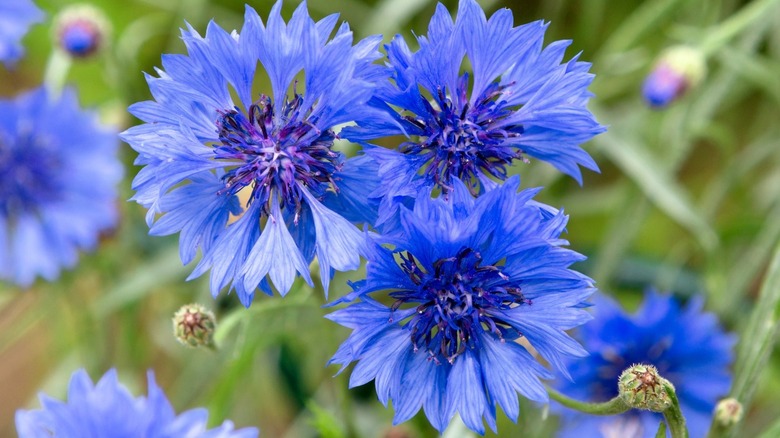By Jessica Jacobs, Contributing Writer
Bachelor buttons, also known as cornflowers, are beloved garden classics that offer timeless beauty and effortless charm. These versatile annuals, with their delicate blooms in shades of blue, pink, white, and purple, have graced gardens for generations. Their appeal lies not only in their aesthetic qualities but also in their practical benefits and ease of cultivation. Whether you’re an experienced gardener or a newcomer, bachelor buttons are a wonderful addition to any garden.
Here’s a detailed look at why you should grow bachelor buttons and practical tips to ensure your success.
10 Reasons to Grow Bachelor Buttons
- Vibrant Color Variety
While their signature hue is a striking true blue, bachelor buttons also bloom in pink, white, and purple. These colors allow for stunning combinations that can elevate your garden’s visual appeal. - Pollinator Magnet
These flowers attract essential pollinators, including bees and butterflies, which contribute to the health and biodiversity of your garden ecosystem. - Beginner-Friendly
Hardy and low-maintenance, bachelor buttons thrive in various soil conditions and require minimal care, making them ideal for novice gardeners. - Perfect Cut Flowers
With their long stems and cheerful blossoms, bachelor buttons are excellent for bouquets, bringing a touch of the outdoors into your home. - Classic Cottage Garden Appeal
Their old-fashioned charm complements other cottage garden staples like roses, daisies, and foxgloves, enhancing your garden’s nostalgic ambiance. - Natural Self-Seeding
Once established, bachelor buttons often reseed themselves, ensuring a colorful display year after year with little effort. - Companion Planting Benefits
Bachelor buttons can repel certain pests and attract beneficial insects, creating a balanced and thriving garden environment. - Symbolic Significance
Associated with love, hope, and remembrance, these flowers add an emotional and symbolic dimension to your garden. - Edible Blooms
Bachelor button petals are edible and can add a decorative flair to salads, desserts, and beverages. Ensure pesticide-free cultivation if you plan to consume them. - Low Maintenance
Requiring only occasional deadheading and infrequent watering, bachelor buttons are an easy-to-care-for choice for busy gardeners.

Essential Growing Tips for Bachelor Buttons
- Sunlight: Choose a sunny location that gets 6-8 hours of direct sunlight daily for optimal growth and flowering.
- Soil: Use well-draining soil that isn’t overly rich in nutrients to encourage more blooms instead of excessive foliage.
- Sowing: Directly sow seeds outdoors after the last frost or start them indoors 3-4 weeks earlier for transplanting.
- Spacing: Maintain 6-12 inches between plants to give them room to grow without overcrowding.
- Watering: Water consistently during dry spells but avoid overwatering, as it can lead to root rot.
- Deadheading: Remove spent blooms regularly to prolong the flowering season and control self-seeding if desired.
- Mulching: Apply a light mulch layer to retain moisture and suppress weeds.
- Support: Taller varieties may need staking to prevent bending in strong winds.
- Pest Control: Monitor for pests like aphids and use organic solutions, such as insecticidal soap, if needed.
- Harvesting: For bouquets, cut stems with blooms that have just opened to ensure vibrant, long-lasting arrangements.
Final Thoughts
Bachelor buttons are more than just pretty flowers; they are versatile, easy to grow, and offer numerous benefits to your garden. From attracting pollinators to enhancing your indoor spaces with fresh-cut flowers, these blooms are a gardener’s delight. With a bit of care and the right growing conditions, you can enjoy their charm season after season.
So why wait? Add bachelor buttons to your garden and let their beauty, symbolism, and practicality enrich your outdoor sanctuary.
